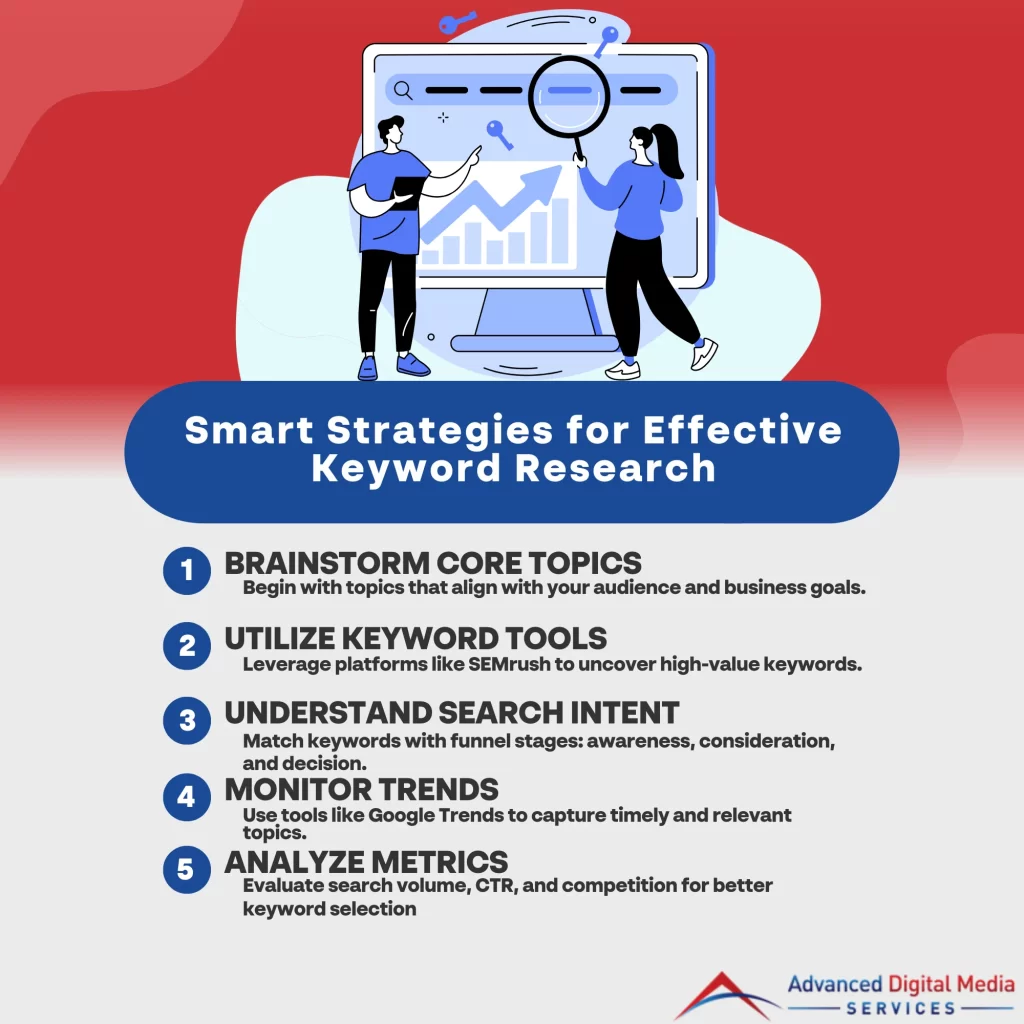To conduct effective keyword research, start by brainstorming topics centered on your business and audience needs. Identify specific searcher intents and target funnel stages—awareness, consideration, and decision—using keyword research tools like SEMrush or Google Keyword Planner. Incorporate creative methods such as competitor analysis and monitoring trending topics. Evaluate metrics like search volume, click-through rates, and competition levels to refine your keywords continually. Don’t overlook seasonal trends that can impact keyword performance. This strategic approach not only aligns your content with user intent but also boosts engagement and traffic. Discover more strategies to enhance your keyword research further.

Key Takeaways
- Begin by brainstorming core business topics and customer challenges to establish a foundation for keyword exploration.
- Utilize keyword research tools like Google Keyword Planner and SEMrush to identify high-value keywords with optimal search volume and low competition.
- Analyze searcher intent by aligning keywords with the awareness, consideration, and decision stages of the customer journey for enhanced engagement.
- Monitor trending topics on social media and industry forums to discover relevant keywords that resonate with current audience interests.
- Regularly evaluate and refine your keyword strategy based on performance metrics such as search volume, CTR, and competition level.
Brainstorm a List of Topics
When diving into keyword research, it’s vital to brainstorm an extensive list of topics that align with your business goals. This initial step is important because it lays the foundation for effective keyword research techniques. Start by considering the core offerings of your business and the problems you solve for your customers. List down these key areas, ensuring you capture both broad and niche topics.
Next, employ tools like Google Trends or AnswerThePublic to expand your list. These platforms can reveal trending queries related to your topics, giving you insights into potential keywords. Don’t forget to include variations and synonyms; this will enhance your keyword pool and improve your chances of ranking.
Additionally, consider your audience’s perspective. What questions are they asking? What challenges do they face? Crafting topics that resonate with their needs not only informs your keyword strategy but also drives relevant organic traffic.
Finally, prioritize your list by potential search volume and relevance to your business objectives. This strategic approach will set you up for success in your keyword research, ensuring you target the right concepts that can elevate your SEO efforts.
Target a Specific Funnel Stage & Searcher Intent
Building on your initial list of topics, it’s important to target specific funnel stages and understand searcher intent to optimize your keyword strategy effectively. By doing so, you can align your content with what users are actively seeking, which is essential for effective keyword research techniques for improved organic SEO traffic.
Here are three key considerations:
- Awareness Stage: Focus on broad keywords that answer general questions. Users in this stage are seeking information.
- Consideration Stage: Target keywords that highlight features, benefits, or comparisons. This helps users evaluate their options and guides them toward a decision.
- Decision Stage: Use specific keywords that drive conversions, such as product names or “buy now” phrases. At this point, users are ready to make a purchase.
Use Keyword Research Tools
Release the full potential of your keyword strategy by utilizing effective keyword research tools. These tools are essential for implementing effective keyword research techniques for improved organic SEO traffic. Start by leveraging platforms like Google Keyword Planner, Ahrefs, or SEMrush, which provide valuable insights into search volume, competition, and trending keywords.
Analyze the data these tools offer to identify high-value keywords that align with your audience’s search intent. Look for keywords with a balance of reasonable search volume and low competition; this strategic approach maximizes your chances of ranking higher in search results.
Additionally, consider using tools that provide SERP analysis. Understanding the current top-ranking pages for your targeted keywords will help you identify content gaps and opportunities for differentiation.
Don’t overlook long-tail keywords, as they often lead to higher conversion rates due to their specificity. By incorporating these keywords into your content strategy, you’ll enhance your site’s visibility and attract more qualified traffic.
Use Creative Research Methods
Creative research methods can greatly enhance your keyword strategy by uncovering unique insights that traditional tools might miss. To tap into these insights, consider the following effective keyword research techniques for improved organic SEO traffic:
- Competitor Analysis: Look at your competitors’ websites and content. Identify keywords they rank for that you might have overlooked. This can reveal gaps in your own strategy and opportunities for new content.
- Customer Feedback: Engage with your audience through surveys or social media. Ask them what terms they use to describe your products or services. Their language can lead you to more relevant keywords that resonate with potential customers.
- Content Exploration: Review existing content in your niche. Platforms like Reddit and Quora can be goldmines for discovering trending topics and questions. This method helps you align your keyword strategy with what users are actively searching for. Don’t let your content become stale; experiment with different topics!
Use Google and YouTube Suggestions
Utilizing Google and YouTube suggestions can greatly enhance your keyword research process by tapping into real-time search data. When you start typing in the search bar, both platforms offer autocomplete suggestions that reflect common queries related to your initial input. This feature provides valuable insights into what users are actively searching for, enabling you to uncover long-tail keywords that can markedly boost your organic SEO traffic.
To leverage these suggestions effectively, begin by entering broad topics related to your niche. Analyze the autocomplete results and note the variations in phrasing and specific questions people are asking. You can also scroll to the bottom of the search results to find “related searches,” which can further inform your strategy.
Incorporating these suggestions into your keyword list is one of the most effective keyword research techniques for improved organic SEO traffic. It aligns your content with actual user intent, ensuring that you target keywords that are not only relevant but also likely to drive traffic. By focusing on these suggestions, you can enhance your overall keyword strategy, leading to higher visibility and engagement on your website.
Analyze Multiple Metrics
Analyzing multiple metrics is essential for refining your keyword research strategy and ensuring that your efforts yield tangible results. By leveraging effective keyword research techniques for improved organic SEO traffic, you can make informed decisions that maximize your online presence. Here are three key metrics to focus on:
- Search Volume: Understanding how many searches a keyword receives monthly helps you gauge its potential reach. High search volume indicates a greater opportunity for traffic.
- Click-Through Rate (CTR): This metric reveals the effectiveness of your keywords in capturing user interest. A high CTR means your selected keywords resonate well with searchers, driving more clicks to your site.
- Competition Level: Assess the competition for your targeted keywords. Low competition keywords can be easier to rank for, giving you a better chance of achieving first-page results.
Keyword Length and Difficulty
When it comes to keyword research, understanding the relationship between keyword length and difficulty is essential for optimizing your SEO strategy. Typically, shorter keywords (one to two words) tend to attract higher search volumes but come with increased competition and difficulty. On the other hand, longer keywords, often referred to as long-tail keywords, usually face less competition and can drive more targeted traffic.
Utilizing effective keyword research techniques for improved organic SEO traffic means striking a balance. You’ll want to incorporate a mix of both short and long keywords in your strategy. Short keywords can help you build brand awareness, while long-tail keywords can convert better due to their specificity.
Moreover, consider the search intent behind keywords. Long-tail keywords often reflect a user’s intent to make a purchase or gather information, making them valuable for driving qualified traffic. Regularly analyzing keyword difficulty using SEO tools will help you refine your strategy over time, allowing you to adapt to changing trends and competition levels. By focusing on both keyword length and difficulty, you’ll enhance your overall SEO effectiveness and drive sustained organic traffic.
Seasonality
Seasonality plays an essential role in keyword research, influencing search trends and user behavior throughout the year. Understanding the cyclical nature of search queries is vital for how to do effective keyword research. By recognizing seasonal patterns, you can better align your content strategy with user intent and maximize your reach.
Consider these three key aspects of seasonality in your keyword research:
- Identify Seasonal Trends: Use tools like Google Trends to pinpoint when specific keywords experience spikes in search volume. This helps you tailor your content calendar.
- Adapt Content Strategy: Plan your campaigns and content around peak seasons relevant to your niche. For instance, if you’re in retail, focus on keywords tied to holidays or significant sales events.
- Monitor Competitors: Keep an eye on how competitors adjust their keyword strategies during seasonal peaks. This insight can inform your own approach and help you stay competitive.
Trending Topics
Trending topics can greatly influence keyword research and content creation, allowing you to tap into current conversations that capture audience interest. By identifying these topics, you can align your content with what people are actively discussing, enhancing your visibility and engagement.
To implement effective keyword research strategies, start by monitoring social media platforms, news outlets, and industry forums. Use tools like Google Trends and BuzzSumo to discover what’s gaining traction. These resources provide insights into popular keywords and themes that resonate with your target audience.
Once you’ve pinpointed trending topics, analyze their relevance to your niche. Confirm that the keywords you select not only reflect current interests but also fit seamlessly into your overall content strategy. This alignment is essential for maximizing organic traffic and maintaining authority in your field.
Additionally, consider the longevity of these trends. Some may be fleeting, while others might evolve into enduring discussions. By staying ahead of the curve and continually adapting your keyword strategy, you can effectively engage your audience and capitalize on emerging opportunities.
On-Site Search
Integrating effective on-site search functionality into your website can greatly enhance user experience and drive engagement. When users can easily find what they’re looking for, they’re more likely to stay and convert. To optimize your on-site search, consider these three strategic steps:
- Implement Autocomplete Suggestions: Help users by providing suggestions as they type. This reduces friction and can guide them toward relevant content, making it easier for them to find what they need.
- Analyze Search Queries: Regularly review the search terms users enter. This data is invaluable for understanding what your audience wants and can inform how to do keyword research for your content strategy.
- Optimize for Relevant Keywords: Guarantee that your website’s content aligns with the keywords users frequently search for. This will improve the relevance of your on-site search results and ultimately enhance user satisfaction.
Frequently Asked Questions
How Often Should I Update My Keyword Research?
You should update your keyword research regularly, ideally every three to six months. This keeps your strategy aligned with evolving trends, ensuring you’re targeting relevant terms that drive organic traffic and enhance your SEO metrics.
What Is the Ideal Number of Keywords per Page?
Think of keywords as the stars of your page’s night sky. Ideally, you want 1 to 3 primary keywords, with a few related terms sprinkled in, ensuring clarity without overwhelming your audience or diminishing relevance.
Can I Use the Same Keywords for Multiple Pages?
You can use the same keywords across multiple pages, but it’s strategic to tailor keywords for each page’s unique content. This approach enhances relevance, improves SEO performance, and avoids keyword cannibalization, boosting overall visibility.
How Do I Measure Keyword Effectiveness Over Time?
To measure keyword effectiveness over time, track metrics like organic traffic, conversion rates, and rankings. Analyze trends regularly, adjust strategies accordingly, and guarantee your approach aligns with changing algorithms for sustained success.
Should I Consider Local Keywords for My Business?
Absolutely, you should consider local keywords for your business. They’re like a lighthouse, guiding nearby customers to your services. By targeting these, you enhance visibility and capture organic traffic, driving growth in your community.
Conclusion
Before diving into the conclusion, let’s take a moment to emphasize the importance of effective keyword research techniques for improved organic SEO traffic. Knowing how to do keyword research goes beyond selecting popular phrases—it’s about understanding your audience’s needs and aligning your content with their search intent. Employing the most effective keyword research strategies, such as competitor analysis and leveraging keyword research tips, can position your site for maximum visibility. By mastering keyword research techniques, you’ll not only drive organic SEO traffic but also build a strong foundation for sustainable growth in the digital landscape. In summary, effective keyword research is essential for your digital marketing success. Did you know that 75% of users never scroll past the first page of search results? This highlights the importance of targeting the right keywords to enhance your visibility. By following the steps outlined, you can strategically connect with your audience and drive organic traffic to your site. Take the time to refine your keyword strategy, and watch your online presence flourish in the competitive marketplace.






